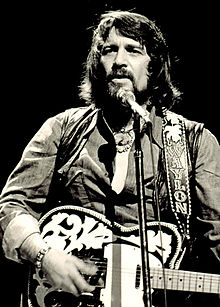Waylon Jennings | |
|---|---|
 Jennings performing on the Johnny Cash Spring Fever Special in 1976 | |
| Background information | |
| Birth name | Waylon Arnold Jennings[1] |
| Also known as |
|
| Born | June 15, 1937 Littlefield, Texas, U.S. |
| Died | February 13, 2002 (aged 64) Chandler, Arizona, U.S. |
| Genres | |
| Occupations |
|
| Instruments |
|
| Years active | 1949–2000 |
| Labels | |
| Formerly of | |
| Spouses |
|
| Children | 6, including Shooter |
| Relatives | Tommy Jennings (brother) |
| Website | waylonjennings |
| Signature | |
 | |
Waylon Arnold Jennings (June 15, 1937 – February 13, 2002) was an American singer, songwriter, musician, and actor. He is considered one of the pioneers of the outlaw movement in country music.
Jennings started playing guitar at age eight and performed at fourteen on KVOW radio, after which he formed his first band, the Texas Longhorns. Jennings left high school at age sixteen, determined to become a musician, and worked as a performer and DJ on KVOW, KDAV, KYTI, KLLL, in Coolidge, Arizona, and Phoenix. In 1958, Buddy Holly arranged Jennings's first recording session, a cover of Jole Blon, and hired him to play bass. Jennings gave up his seat on the ill-fated flight in 1959 that crashed and killed Holly, J. P. "the Big Bopper" Richardson and Ritchie Valens.
Jennings then returned to Texas, taking several years off from music before eventually moving to Arizona and forming a rockabilly club band, the Waylors, which became the house band at "JD's", a club in Tempe, Arizona.[2] He recorded for independent label Trend Records and A&M Records, but did not achieve success until moving to RCA Victor in 1965. In 1972 he acquired Neil Reshen as his manager, who negotiated significantly better touring and recording contracts. After he gained creative control from RCA Records, he released the critically acclaimed albums Lonesome, On'ry and Mean and Honky Tonk Heroes, followed by the hit albums Dreaming My Dreams and Are You Ready for the Country.
During the 1970s, Jennings drove outlaw country. With Willie Nelson, Tompall Glaser, and Jessi Colter he recorded country music's first platinum album, Wanted! The Outlaws. It was followed by another platinum album, a first for any solo artist in country music, Ol' Waylon, and the hit song "Luckenbach, Texas". He was featured on the 1978 album White Mansions, performed by various artists documenting the lives of Confederates during the Civil War. He appeared in films and television series, including Sesame Street and a stint as the balladeer on The Dukes of Hazzard, composing and singing its theme song and narrating the show.
Jennings struggled with cocaine addiction, which he overcame in 1984. Later, he joined the country supergroup the Highwaymen with Willie Nelson, Kris Kristofferson, and Johnny Cash, which released three albums between 1985 and 1995. During that period, Jennings released the successful album Will the Wolf Survive. He has been named as one of the innovators of progressive country.[3]
Jennings toured less after 1997 to spend more time with his family. Between 1999 and 2001, health problems limited his appearances. In 2001, he was inducted into the Country Music Hall of Fame. In 2007, he was posthumously awarded the Cliffie Stone Pioneer Award by the Academy of Country Music.
- ^ Raye, Miranda (March 14, 2019). "Waylon Jennings' Real Name Wasn't 'Waylon'". countryrebel.com. Retrieved March 18, 2023.
- ^ "Report to the Board of Adjustment Prepared by the Maricopa County Planning and Development Department". www.maricopa.gov. April 18, 2019.
- ^ Rockwell, John (April 8, 1976). "The Pop Life". The New York Times. Retrieved July 22, 2023.
The term "progressive" country normally applies to a Texas‐based coterie around Willie Nelson and such Nashville‐centered innovators as Waylon Jennings and Tompall Glaser.